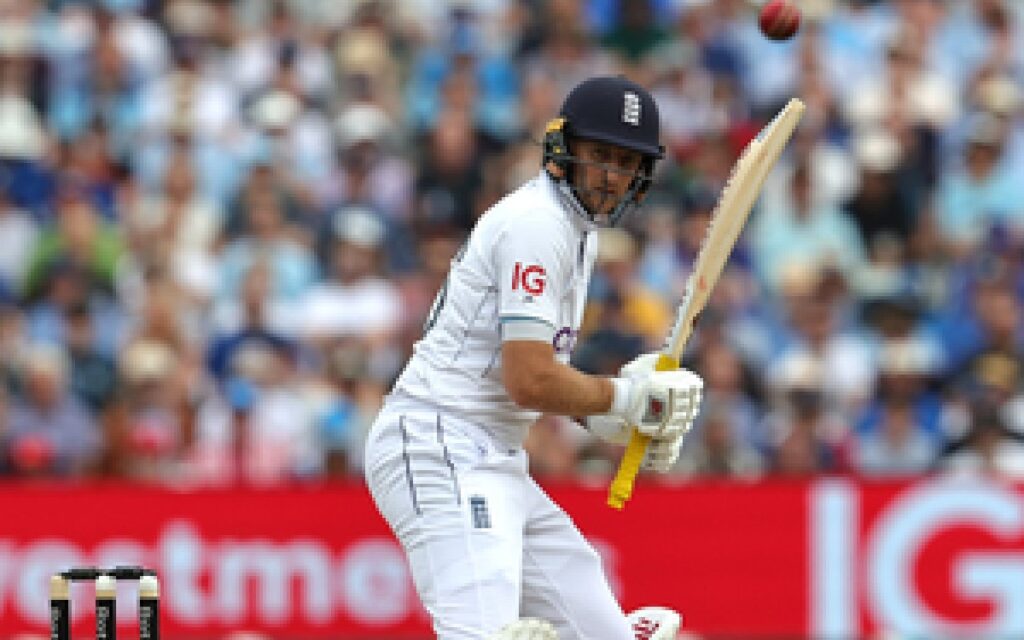Old Trafford Stadium: Joe Root found himself channeling his “inner Nasser Hussain” after England found themselves in a taxing run chase of 205 in a tricky slow pitch against Sri Lanka in the first Test at the Old Trafford Stadium.
Root’s task was not to dominate but to endure, and in doing so, he crafted an innings of 62 not out that would prove vital in England’s hard-fought five-wicket victory. Root’s unbeaten 62 from 128 balls was the anchor that held England’s innings together.
Shortly following England’s five-wicket victory on the fourth evening of the match, Root spoke with Hussain and Ian Ward on Sky Sports. He mentioned Hussain’s well-known nuggety batting style and career strike-rate of forty, adding that he was also now referred to as “Geoff” in the England dressing room, a reference to another legendary English player from the past, Geoff Boycott.
“I had to channel my inner Hussain, I reckon,” Root joked when interviewed alongside Hussain for Sky Sports. “I’m still ahead of your career strike-rate, but it was a tricky one today. It was a long, slow, hard grind but we got there in the end.
“The wicket lost a lot of pace throughout and I didn’t really feel comfortable trying to muscle it, so I just had to accumulate in a slightly different way.”
The conditions had forced Root to adapt his game. The Old Trafford wicket, with its increasingly low bounce and lack of pace, was reminiscent of the slow, abrasive tracks found in Sri Lanka. The heavy overnight rain had further slowed the outfield, making boundaries a rare commodity. Root knew that trying to force the pace would be a mistake; instead, he focused on accumulating runs in singles and twos, playing with soft hands and impeccable judgment.
“It was a tricky one today,” Root admitted in the post-match interview. “The outfield was the longest I’ve seen in England for a while, and the wicket itself lost a lot of pace. It felt like trying to muscle the ball would only bring the fielders into play, so I had to accumulate runs in a slightly different way.”
Root’s innings was built around two crucial partnerships. The first was a 49-run stand with Harry Brook, who brought his usual flair to the crease. Brook, with his aggressive strokeplay, kept the scoreboard ticking while Root focused on playing the anchor role. Their partnership steadied the ship after England had lost two early wickets, setting the foundation for the chase.
The second stand, a 64-run partnership with Jamie Smith, was the turning point. Smith, who had already made a name for himself with a century in the first innings, continued his fine form with a vital 39 from 48 balls. His aggressive approach took the pressure off Root, allowing the senior batsman to continue his methodical accumulation.
“That’s the beauty of partnerships,” Root explained. “Brookie is always going to score freely, and Jamie’s in great form as well. It’s just nice to feed off each other.”
As the winning runs were struck, Root and Smith embraced in the middle of the pitch, a moment of triumph in what had been a gritty contest. The victory was particularly sweet as it marked Ollie Pope’s first win as captain. Though Pope had a tough match with the bat, scoring only 6 in both innings, Root was quick to praise his leadership.
“Obviously I offered a few bits here and there, but I didn’t need to offer much,” Root said of his former deputy. “He was very much in control of what was going on. It wasn’t straightforward, but he kept changing things up, trying different strategies, and constantly moving the game in the right direction.”
Root’s praise extended to Jamie Smith, England’s player of the match, whose all-around performance had been crucial to the victory. “He’s a phenomenal player,” Root said. “His glovework has been exceptional, and his batting has shown everything you want from a No.7. He can bat with the tail, take the game on aggressively, and manage periods of play when needed.”
“Obviously I offered a few bits here and there, but I didn’t need to offer much,” Root said of his former deputy. “He was very much in control of what was going on. It wasn’t straightforward, but he kept changing things up, trying different strategies, and constantly moving the game in the right direction.”
Article Source: IANS


